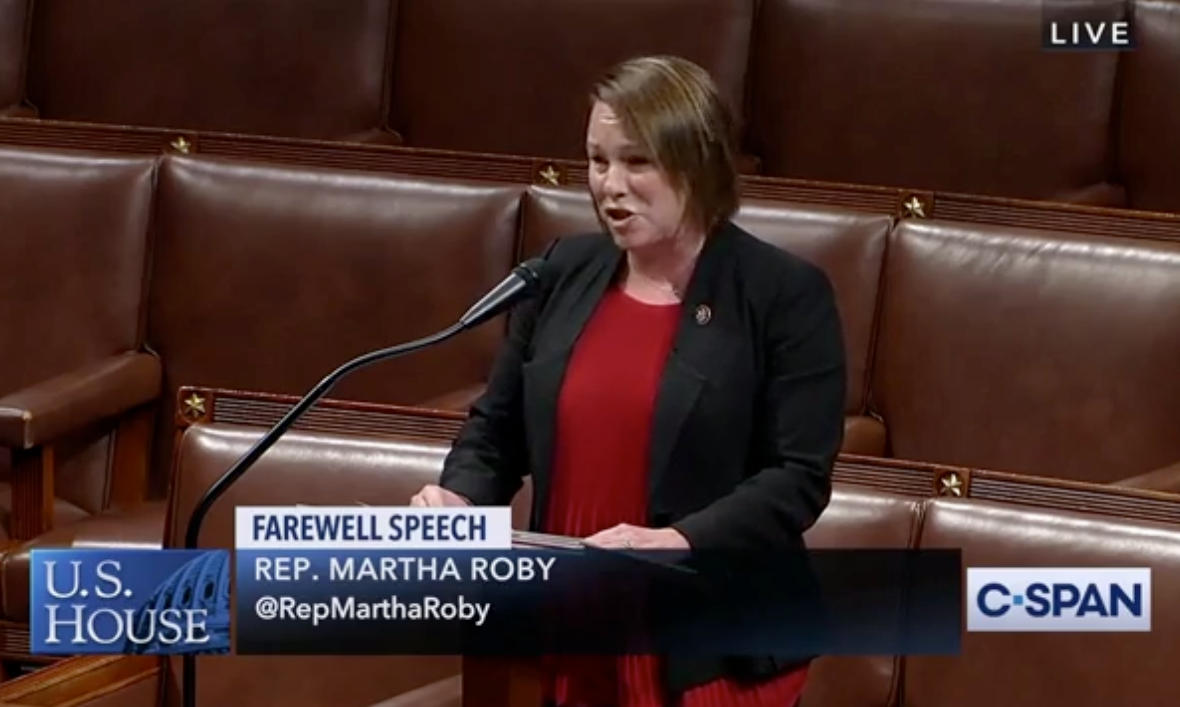By U. S. Representative Martha Roby (R-AL2)
Our nation’s military is the most advanced and battle-hardened fighting force in history. The proficiency of the American men and women who serve in uniform is respected around the world. Their ability to get the job done is unmatched, and their sacrifice to our country is an inspiration to us all.
So it’s disheartening to think that the greatest threat to the future of our force is not some foreign foe, but rather the U.S. Congress.
Sequestration looms. Absent congressional action, automatic defense cuts will reduce the defense budget by $55 billion below the annual levels established in the Budget Control Act. That means an additional $500 billion in cuts will be imposed on top of the $487 billion already being implemented. In total, nearly $1 trillion will be cut over the next 10 years.
How did we get here? Unprecedented government spending and debt led to a Republican takeover of the House in 2011. Since then, we helped change the conversation from “How much can we spend?” to “How much can we cut?” In general, that medicine has been good for the country and should continue, even when it is tough to swallow.
But serious negotiations over the national debt limit led to the eventual passage of the Budget Control Act of 2011 (BCA), which was more of a political solution than a policy decision. The legislation imposed spending caps, raised the debt limit and created a bipartisan Select Joint Committee to find an additional $1.2 trillion in spending reductions. If the committee faltered, these cuts would be imposed automatically, half coming from defense accounts. (I opposed the plan for this reason.) Unfortunately, the committee ultimately failed, triggering about one-half trillion in defense cuts to start January 2013.
Cuts of that severity are unacceptable, and Defense Department leaders have voiced serious warnings over the devastating effects they will cause. Defense Secretary Leon Panetta recently said, “Facing such large reductions, we would have to reduce the size of the military sharply. Rough estimates suggest after 10 years of these cuts, we would have the smallest ground force since 1940, the smallest number of ships since 1915, and the smallest Air Force in its history.
In a Senate Appropriations Defense subcommittee hearing this month, Chairman of the Joint Chiefs of Staff Gen. Martin Dempsey said “sequestration would risk hollowing out our force and reducing [its] military options available to the nation.”
Sequestration will affect every branch of the military and every state home to defense installations. The proposed reductions will separate tens of thousands of soldiers, sailors, Marines and airmen from service.
There is broad acknowledgment that sequestration will be devastating but little urgency to do anything about it. There is neither a plan to repeal the automatic cuts nor to enforce them. As Panetta reportedly said, you “can’t plan for something that was designed to be crazy.”
However, positive developments have recently occurred:
- In June, three House chairmen, including Armed Services Committee Chairman Buck McKeon (R-Calif.), wrote to President Obama “that a comprehensive review of the mechanics of sequestration and the impacts it will have to various programs would go a long way to informing a bipartisan solution to the problem.”
- In May, the House passed H.R. 5652, the Sequestration, Replacement and Reconciliation Act, to cancel the sequestration of defense spending currently scheduled for next year, replacing it with reductions to other discretionary programs and mandatory spending cuts offered by six congressional committees.
- And this month, Sen. John McCain (R-Ariz.) led a successful effort to require the Defense Department and the Office of Management and Budget to outline the national security consequences of the budget sequestration required by the BCA. His initiative instructs the Pentagon to detail the risks associated with such spending cuts in a report by Aug. 15.
Despite this, the path ahead is unclear. With only 32 legislative days remaining prior to the election, the situation is growing more alarming.
Conventional wisdom dictates that Washington will deal with sequestration in a lame-duck session, but Congress’s “to do” list for November is long: lawmakers must address the Bush tax cuts, the payroll tax holiday, a Medicare “doctors’ fix” and an omnibus spending bill. Even with each of these important issues on the table, sequestration is, arguably, the most pressing. The consequences set in motion by the committee’s failure are approaching at full speed as the January deadline nears. Failure to act will mean our robust military will not be able to operate in the future as it does today.
The generals have raised the red flag on sequestration, the troops on the ground are well aware of its long-term effects and our military families are looking for answers. It’s time the president and the Congress make it a priority to reverse these ill-conceived automatic cuts.
Martha Roby represents Alabama’s 2nd Congressional District. She is currently serving her third term.


















































